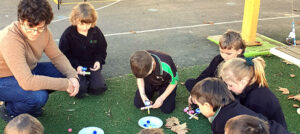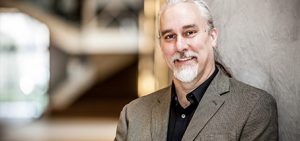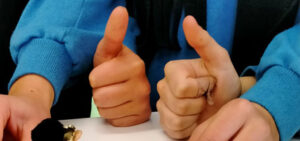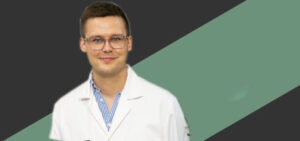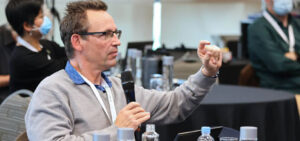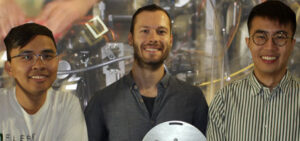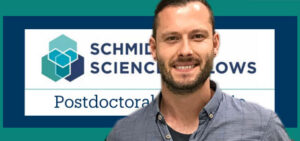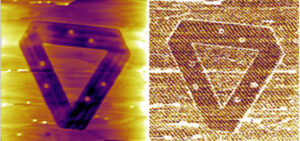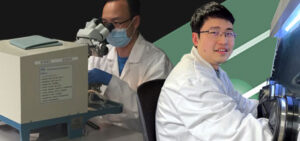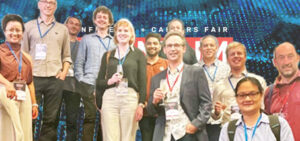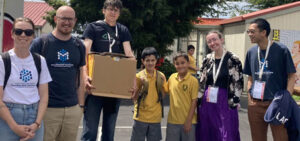Engage
See news from around FLEET, below
Catch up on all past issues of FLEET News newsletter
FLEET News
Learning about ‘wavy’ stuff you can’t see, smell, taste or touch can test students’ intuitive understanding of the world. FLEET’s latest Forces and Energy teacher resource examines energy from the physics of Newton to Einstein, to the wavy behaviour of sub-atomic particles such as electrons. Students learn how energy is crucial to our understanding of how everything in the universe …
Leading materials physicist and FLEET Director Prof Michael Fuhrer has been recognised for his contributions to science, elected a Fellow of the Australian Academy of Science. Professor Fuhrer is one of 20 researchers elected as Fellow of the Australian Academy of Science, announced today. Prof Michael Fuhrer is an international leader in study of the electronic properties of 2D and …
Teaching energy, releasing creativity, and inspiring future scientists FLEET and Monash volunteers used catapults, graphite circuits and diffraction goggles to create challenges for 250 Mater Christi College students competing to win their annual STEM Cup. For the STEM Cup challenge, which is judged on teamwork, innovation and communication, FLEET designed two hands-on workshops that got middle and senior secondary students …
FLEET is pleased to announce that Dr Torben Daeneke is now a Chief Investigator in FLEET. As a Scientific Associate Investigator in FLEET (RMIT node) since the outset of the Centre, Torben and has been a prodigious contributor to FLEET’s research effort as well as FLEET’s governance. “I welcome the opportunity to become a FLEET Chief Investigator,” says Torben. “I …
Unleashing the combined power of electrons and holes for better quantum computing Congratulations to FLEET Deputy Director Prof Alex Hamilton, who has been named an Industry Laureate Fellow by the ARC. Alex and his team at UNSW receive $3.8 million towards ground-breaking silicon-based quantum-computer technology to dramatically speed up computation, enabling Australia to maintain its global lead in quantum technologies. …
First published Australian National University A surprise observation of negative mass in exciton-polaritons has added yet another dimension of weirdness to these strange light-matter hybrid particles. Dr Matthias Wurdack, Dr Tinghe Yun and Dr Eliezer Estrecho from the Department of Quantum Sciences and Technology (QST) were experimenting with exciton polaritons when they realised that under certain conditions the dispersion became …
Congratulations to Dr Matthias Wurdack (FLEET/ANU), who has received a Schmidt Science Fellowship to develop artificial retinas. Matthias started his’ PhD at ANU in 2018, working with FLEET CI Elena Ostrovskaya to create, investigate and engineer the properties of hybrid light-matter particles in atomically-thin semiconductors with the aim to realise room temperature superfluidity based on this material platform, and understand and elevate …
A process has been developed to engineer nanoscale arrays of conducting channels for advanced scalable electronic circuitry Using ion implantation and lithography, investigators created patterns of topological surface edge states on a topological material that made the surface edges conductive while the bulk layer beneath remained an insulator Low energy ion implantation, neutron and X-ray reflectometry techniques at ANSTO supported …
Can a solid be a superfluid? Bilayer excitons form a quantum supersolid A collaboration of Australian and European physicists predict that layered electronic 2D semiconductors can host a curious quantum phase of matter called the supersolid. The supersolid is a very counterintuitive phase indeed. It is made up of particles that simultaneously form a rigid crystal and yet at the …
Electrically controlled superconductor-to-“failed insulator” transition, and giant anomalous Hall effect in the kagome metal CsV3Sb5 A new RMIT-led international collaboration published in February has uncovered, for the first time, a distinct disorder-driven bosonic superconductor-insulator transition. The discovery outlines a global picture of the giant anomalous Hall effect and reveals its correlation with the unconventional charge density wave in the AV3Sb5 …
Written by Matt Gebert, FLEET PhD candidate, Monash University A large contingent of 14 FLEET members and alumni enjoyed the Quantum Australia conference last week, engaging in discussions about the future of quantum technologies with a lot of interest focused in quantum computing, in addition to sensing. I attended as a PhD student approaching the end of my candidacy, and …
Four FLEET researchers have received partial Centre funding to attend Women & Leadership Australia Impact program: PhD student Bianca Rae Fabricante (ANU) PhD student Patjaree Aukarasereenont (RMIT) Diversity in FLEET fellow Dr Mengting Zhao (Monash) Research Fellow Dr Amelia Dominguez (Monash) “FLEET’s strategic priorities include developing the next generation of science leaders, and fostering equity and diversity in STEM,” says …
FLEET and MacDiarmid Institute members teamed up at the recent AMN10 conference in Rotorua NZ to conduct science outreach workshops for 320 local school students. Over four days, 25 volunteers from FLEET and partner organisation the MacDiarmid Institute visited seven schools and presented a variety of hands-on science workshops to students ranging from year 4 to 9, in a program …
In 2022 FLEET extended outreach activities to a number of regional and remote schools. Such schools have limited opportunities to engage with visiting scientists, or to and participate with them in hands-on science workshops. Engagement with working scientists, and hands-on exercises, helps engage students’ curiosity, and exposes them to a greater breadth and depth of career opportunities in STEM and …

